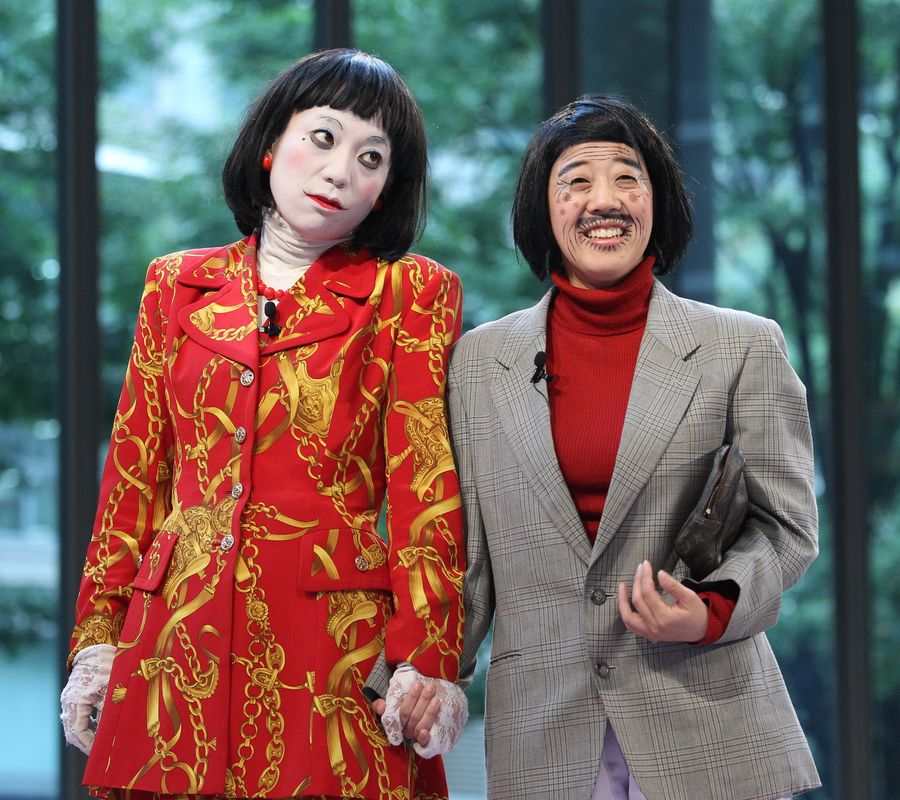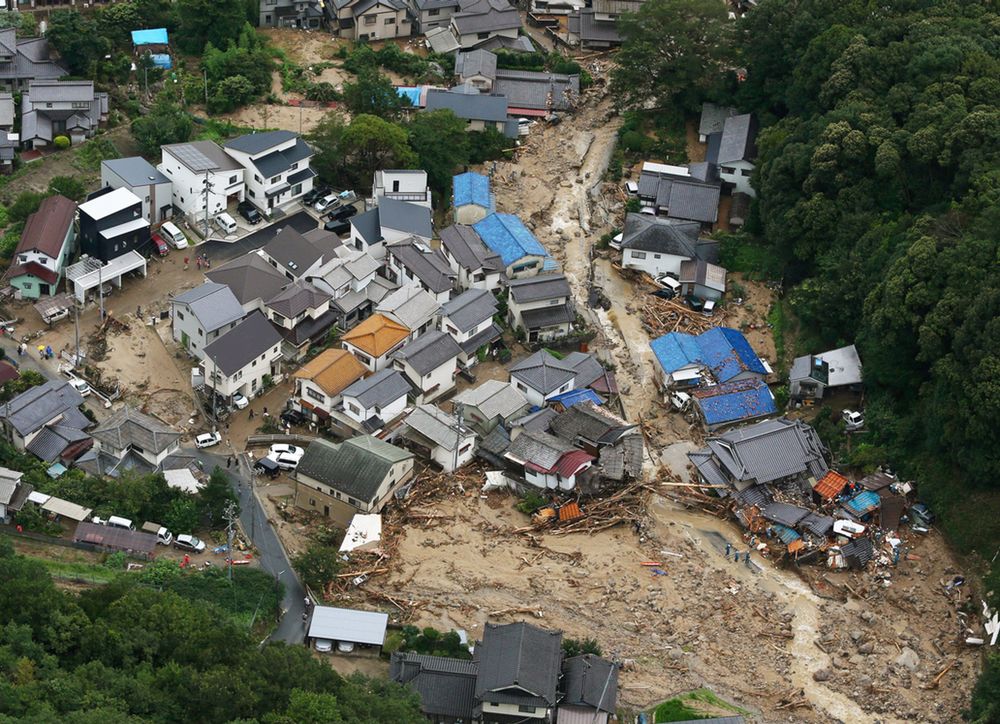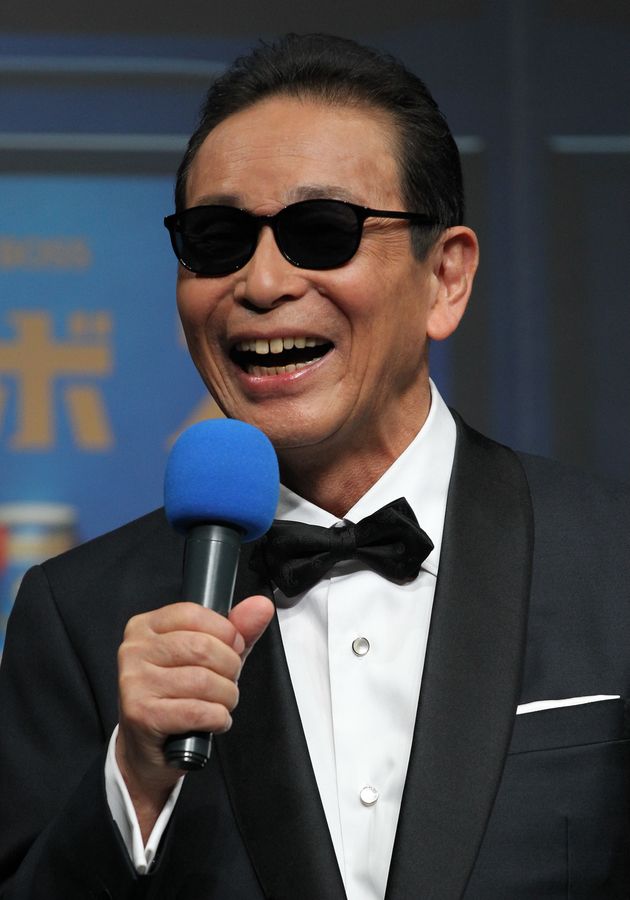
The Words of 2014
Politics Economy Science Technology Society- English
- 日本語
- 简体字
- 繁體字
- Français
- Español
- العربية
- Русский
UPDATE: The winners and the top-10 list have been announced! Click here for our coverage.
Each year Jiyū Kokumin Sha, publisher of the popular annual reference Gendai yōgo no kiso chishiki (Basic Knowledge on Contemporary Terminology), selects its “most popular word of the year.” The terms in the running for this honor are the words and phrases that have figured largely in the zeitgeist of the previous 12 months. Today the company announced its long list of 50 nominees, which we detail below. The finalists and champion will be announced on Monday, December 1.
The terms on this list are a compact overview of some of the events and ideas that touched the lives of the Japanese people over the past year. (Look back to last year’s entries with “The Words of 2013,” the list of all 50 nominees, and “2013: The Winning Words.”)
The 50 Nominees
輝く女性 — Kagayaku josei. “Women who shine” are successful women who serve as an example and inspiration to their peers. Women-centered policies were one key part of Prime Minister Abe Shinzō’s “Abenomics” growth strategies for the recovery of Japan.
バックビルディング — Bakku birudingu. A “back-building,” or leading thunderstorm, appears to remain stationary or accumulate clouds in a backward direction due to the direction of the wind. Severe storms that caused widespread damage in Okinawa and Niigata Prefectures in July 2014 have been linked to this phenomenon.
トリクルダウン — Torikuru daun. “Trickle-down” economics, once a cornerstone of US President Ronald Reagan’s policy, showed up in Japan this year. As part of its strategies to stimulate economic growth, Abenomics promoted the idea of stimulus packages for large corporations, in the belief that wealth generated by big business and individuals will percolate down through the economy to benefit the very poorest sectors of society.
ダメよ~ダメダメ — Dame yo. Dame dame. This “No way. No, no” catchphrase was popularized by the female comedy duo Nippon Erekiteru Rengō. The comediennes made their name with sketches in which a gaudily dressed, heavily made-up robot lover played by Hashimoto Koyuki would use the phrase to rebuff the sometimes amorous advances of her partner Nakano Sōko, made-up to look like an elderly gentleman.
 Nippon Erekiteru Rengō in action. (© Jiji)
Nippon Erekiteru Rengō in action. (© Jiji)
危険ドラッグ — Kiken doraggu. “Dangerous drugs” are some of the legal highs that can be easily procured online and from the nation’s “head shops.” Such substances were previously referred to as dappō doraggu, “loophole substances” skirting Japan’s famously strict drug laws, but in an effort to emphasize the risks carried by the use of such unregulated, poorly understood substances, the official term was changed to this “dangerous” version in July 2014.
家事ハラ — Kaji hara. “Housework harassment” was coined to describe cases in which one member of a family or household disdains another’s efforts to contribute to the housework through subtly cutting remarks and passive-aggressive gestures, such as rewashing dishes already cleaned by the counterpart. In a summer 2014 survey, some 70% of male respondents answered that they felt subjected to kaji hara by their wives or partners.
ありのままで — Ari no mama de. “Just as I am.” This phrase featured in the chorus of the Japanese version of “Let It Go,” the theme tune to Disney’s hit movie Frozen. Takahashi Chikae translated the lyrics into Japanese and the track was performed by Matsu Takako.
こぴっと — Kopitto. This phrase, meaning “thoroughly” or “properly” in the Yamanashi Prefecture dialect, was brought to a wider audience by the NHK morning drama Hanako to An (“Hanako and Anne”). The series centered on the life of Muraoka Hanako, the translator who produced the Japanese version of Anne of Green Gables, who hailed from the city of Kōfu, Yamanashi.
リトル本田 — Ritoru Honda. At his first press conference following his summer 2014 trade to Italian giants AC Milan, Japanese soccer star Honda Keisuke described how he had reached the decision after listening to the “Little Honda” within himself.
ゴーストライター — Gōsutoraitā. A “ghostwriter” scandal erupted in February 2014 when it was revealed that the popular classical composer Samuragōchi Mamoru had spent 18 years taking credit for more than 20 pieces penned by ghostwriter Niigaki Takashi. Niigaki also suggested that Samuragōchi, who had once been dubbed “Japan’s Beethoven,” was not deaf, as he claimed.
マイルドヤンキー — Mairudo yankī. “Mild yankees,” or mellow rebels, were so named by social commentator Harada Yōhei in his descriptions of the softer, less openly rebellious variety of social miscreants that have developed from the yankī street toughs of earlier days.
JKビジネス — JK bijinesu. The initials beginning this “JK business” phrase stand for joshi kōsei, or “high-school girl.” The term refers to the illicit business of teenage girls charging male patrons for companionship, massage, and other services, using legitimate businesses in districts like Tokyo’s Akihabara for cover. There have been many reported cases of these girls falling victim to violence and abuse while involved in such practices.
 Veteran jumper Kasai Noriaki takes the Sochi podium to accept his silver medal. (© Jiji)
Veteran jumper Kasai Noriaki takes the Sochi podium to accept his silver medal. (© Jiji)
レジェンド — Rejendo. “Legend” is the nickname of ski jumper Kasai Noriaki, who, at the age of 41, was the oldest member of the Japanese team sent to compete in the Sochi Winter Olympics in February. Despite his years, Kasai captured the silver medal in the individual large-hill event and also earned a bronze in the team event in his seventh trip to the Winter Games since his debut at the 1992 games in Albertville.
妖怪ウォッチ — Yōkai Uocchi. Yōkai Watch, a Nintendo 3DS game about a special timepiece that makes it possible to see supernatural spirits, spawned an anime series and endless merchandising, achieving a ubiquitous presence during the year.
マウンティング(女子) — Mauntingu (joshi). “Mounting women” assert their superiority and establish a hierarchy by insisting that they are happier and more satisfied in love and life than other women. The term is derived from the way dogs display their dominance by mounting.
女装子 — Josoko. — “Men dressing as women” became a much-discussed topic, whether in questions of gender identity or for cosplay fun. Famous “cross-dresser” Matsuko Deluxe made regular TV appearances throughout the year.
セクハラやじ — Sekuhara yaji. “Sexist heckling” at the Tokyo Metropolitan Assembly hit the headlines in June when a female member’s mention of the need for policy to address women’s concerns drew catcalls from male members, such as “Why don’t you get married first?” and “What’s the matter, are you barren?”
限定容認 — Gentei yōnin. The “limited approval” of Japan’s exercise of collective self-defense was recommended in a May 15 report from the Advisory Panel on Reconstruction of the Legal Basis for Security.
勝てない相手はもういない — Katenai aite wa mō inai. Having reached the US Open quarterfinals, tennis star Nishikori Kei made the confident statement, “There’s nobody I can’t beat.” Although he managed to defeat world number one Novak Djokovic in the semifinal round, he lost the final in straight sets.
ワンオペ — Wan ope. The abbreviated form of “one operation” creatively borrows English words to describe a solo shift for a part-time worker, an increasingly common phenomenon as labor shortages worsen. Fast food chain Sukiya’s common practice of having one employee take the graveyard shift in its restaurants was a factor in protests and strikes.
消滅可能性都市 — Shōmetsu kanōsei toshi. Due to the ongoing migration from regional areas to Japan’s major metropolises, and the lack of young women in particular, some municipalities are in danger of disappearing altogether. According to a May report, there are some 896 of these “cities that may become extinct.”
ミドリムシ — Midorimushi. The common Japanese name for the microorganism euglena drew attention for the excitement surrounding its potential application to global problems. With its high nutritional content and powers of carbon sequestration, there are hopes it could address both food shortages and environmental problems.
イスラム国 — Isuramu koku. The extremist rebel group Islamic State gained the same prominence in Japan in 2014 as in the rest of the world. Japanese national Yukawa Haruna was taken hostage by the group in August.
昼顔 — Hirugao. The “daytime face” that housewives wear to meet their lovers for affairs when their husbands are away at work derives from a longer expression, heijitsu hirugao-zuma (weekday daytime-face wives). The shortened form was part of the title of a popular television drama in 2014.
ビットコイン — Bittokoin. The Bitcoin cryptocurrency had its largest currency exchange in the world right here in Japan in the company Mt. Gox. In February this firm filed for bankruptcy in the Tokyo District Court, making millions of dollars worth of Bitcoin seem to vanish in a flash and turning the virtual currency into a household name in Japan.
STAP細胞はあります — STAP saibō wa arimasu. “STAP cells exist” are the words embroiled RIKEN researcher Obokata Haruko used to defend her research at an April press conference. Two papers on STAP (stimulus-triggered acquisition of pluripotency) cells coauthored by Obokata came under heavy scrutiny and were later retracted due to alleged improprieties.
まさ土 — Masatsuchi/masado. Decomposed granite and heavy rains combined to trigger landslides that killed more than 70 in Hiroshima in August. Loosely packed strata of weathered granite particles in the hills surrounding the Asaminami and Asakita districts gave way following torrential rains, inundating large swaths of the communities.
 Hiroshima communities were battered by devastating landslides in August. (© Jiji)
Hiroshima communities were battered by devastating landslides in August. (© Jiji)
デング熱 — Dengu netsu. A dengue fever outbreak in Tokyo, the first in nearly 70 years, caught Japan by surprise. Before the city was declared dengue free in October, the outbreak had sickened over 100 in the greater metropolitan area and led to the temporary closure of Yoyogi Park and other public spaces.
2025年問題 — 2025 nen mondai. The 2025 problem poses a serious challenge to the viability of Japan’s social insurance system. 2025 will mark Japan’s transformation to a hyper-aged society, with one in every four people being 75 or older.
アイス・バケツ・チャレンジ — Aisu baketsu charenji. The ice bucket challenge was a charity movement to raise awareness of ALS (amyotrophic lateral sclerosis), also known as Lou Gehrig’s Disease. Participants were challenged to dump a bucket of ice water over their heads or make a donation toward ALS research. (Many did both.) The challenge made it to Japan, with many public figures, including Softbank chief Son Masayoshi (below), posting videos and images of their dousings on the Internet.
マタハラ — Matahara. “Maternity harassment” became news among a broader push to revive Japan’s economy by empowering women. Employers penalizing women employees for taking time off to give birth or care for children, such as by passing them over for promotion or pressuring them to resign, came under scrutiny. Japan’s Supreme Court in October ordered a retrial of a case involving claims of maternity harassment by a hospital worker that had previously been decided in favor of the employer.
レリゴー — Rerigō. The Japanese version of “Let It Go” from Disney’s animated blockbuster Frozen was a gigantic hit for children and grown-ups alike. This katakana term approximates how the song’s English title is actually pronounced. It gained popularity through sing-along viewings of the film and even turned into a conjugatable verb, rerigoru—“to sing ‘Let It Go.’”
ごきげんよう — Gokigen yō. Veteran singer and actor Miwa Akihiro used this phrase to end each episode of NHK’s serial morning drama Hanako to An (“Hanako and Anne”), which he narrated. It politely inquires as to the wellbeing of the person and can be used as both a formal greeting and farewell. The phrase made an appearance in the drama as well, with the young Hana having the salutation drilled into her by her strict headmistress as a means of making the young protagonist sound more cultured.
J婚 — J kon. Members of Japan’s Self-Defense Forces became hot items as potential marriage partners. The J comes from jieikan, as members of the Self-Defense Force are called, and kon from kekkon (marriage). Parties featuring jiekan become hot events for those with hopes of snapping up a spouse in uniform.
 Tamori (Morita Kazuyoshi) remains a fixture on the entertainment scene even after leaving Waratte ii tomo. (© Jiji)
Tamori (Morita Kazuyoshi) remains a fixture on the entertainment scene even after leaving Waratte ii tomo. (© Jiji)
タモロス — Tamorosu. Fans of afternoon television longed for beloved veteran comedian Tamori when the variety program Waratte ii tomo, which he hosted, ended its 32-year run. Many viewers grew up watching the program and suffered from Tamorosu, or an acute sense of loss caused by the lack of Tamori to make them chuckle.
リベンジポルノ — Ribenji poruno. The police have begun to crack down heavily on jilted lovers posting pictures, videos, and other types of “revenge porn” over the Internet. Their efforts are expected to receive a boost from a recent bill passed in Japan’s House of Representatives criminalizing the act of posting indecent images of past partners.
絶景 — Zekkei. Books showing these stunningly “beautiful scenes” became all the rage after the book Shinu madeni ikitai! Sekai no zekkei (Beautiful Scenes Around the World I Want to See Before I Die) became a huge hit in 2013.
ゆづ — “Yuzu” is the fan nickname for Hanyū Yuzuru, the figure skater who won Japan’s—and indeed, Asia’s—first Olympic gold medal for men’s singles figure skating at the Sochi Games in February. At the World Championships held in Saitama Prefecture in March, he won the men’s singles title, placing ahead of countryman Machida Tatsuki, who took silver.
塩対応 — Shio taiō. The “salty treatment” refers to the cold shoulder some fans receive at meet-and-greet events letting them see their favorite idol musicians up close. Sometimes phrased simply as shio, “salt,” this greeting is the polar opposite of kami taiō—the “godly treatment” the fans hope to see in the form of warm smiles and lengthy handshakes from these stars.
こじらせ女子 — Kojirase-joshi appears on the candidate list for the second straight year. The name for these young women who “just can’t get it right” comes from Amamiya Mami’s 2011 book Joshi o kojirasete. Their bad luck in romance and lack of self-confidence and ambition were highlighted in the TV drama Kyō wa kaisha yasumimasu (I’m Taking Today Off from Work), whose female lead, played by Ayase Haruka, exemplified this breed.
号泣会見 — Gōkyū kaiken. The “bawling press conference” that had everyone talking was that given by Nonomura Ryūtarō, a member of the Hyōgo Prefectural Assembly, on July 1 to explain nearly 200 suspicious trips taken to onsen hot springs and other destinations. In all he spent some ¥3 million in public funds while producing no receipts for the trips or politically relevant findings from them.
集団的自衛権 —Shūdanteki jieiken. Another repeat from last year’s list, the “right to collective self-defense” refers to Japan’s ability to engage in combat operations in support of allies that are under attack. Article 9 of Japan’s Constitution has traditionally been interpreted as disallowing this, but a July 1 resolution by the Abe cabinet set the stage for a new interpretation that would let Japan take on this role.
積極的平和主義 — Sekkyokuteki heiwa shugi. “Proactive pacifism” is a concept informing the National Security Strategy adopted in late December 2013. Prime Minister Abe has made this a key term in his security policy, positioning it as a way for Japan to play a meaningful role on the international stage while remaining dedicated to the cause of peace.
カープ女子 — Kāpu joshi. The “Carp girls” are young female fans of the Hiroshima professional baseball team. The Hiroshima Carp are the only Nippon Professional Baseball team without corporate ownership, and as such have had to be more creative in the marketing and merchandising fields to remain financially sound. It seems that this outreach has paid off in the form of more, and more fervent, women fans—not just in the home market of Hiroshima, but in the Tokyo area as well.
ハーフハーフ — Hāfu hāfu. “Half-half” was the answer given by figure skater Asada Mao at a February 25 press conference when asked whether she was considering retirement after her sixth-place finish at the Sochi Olympics, or whether she intended to continue skating competitively. That same season she went on to win the World Championship title in March. On May 19 Asada announced she would take the 2014–15 season off, giving herself a year to ponder her next moves.
壁ドン — Kabe don. “Pounding the wall” is traditionally what you do when the neighbor in your apartment complex turns the music up too late at night. This term’s other meaning, though, is the pose struck when (usually) a man puts his arm up on the wall next to (usually) a woman, the better to keep her in place while he sweet-talks her. This is a common visual trope in manga works in recent years.
壊憲記念日 — Kai-Ken kinenbi. The characters you’d expect to see at the front of this term, 改憲, mean “amending the Constitution.” Here “amend” is swapped out for the homophonic “destroy” to signify the way that many feel about the Abe administration’s moves to rewrite parts of the nation’s basic law.
雨傘革命 — Amagasa kakumei. The Umbrella Revolution, the popular protests in Hong Kong carried out by students and other people seeking a stronger voice for themselves in their territory’s government, began in September. Japan, along with much of the world, watched closely to see whether their demands for universal suffrage and the ability to locally select candidates for the Hong Kong legislative council and chief executive would be met.
塩レモン — Shio remon. Salted preserved lemons saw a boom in popularity this year on the Japanese cooking scene. A search on Cookpad, Japan’s top recipe-sharing social website, returns more than 2,500 entries using salted lemons as an ingredient. Lifestyle magazines have printed special features on how to use this flavor, and bookstores now stock multiple cookbooks focused on shio remon cuisine.
エボラ出血熱 — Ebora shukketsu netsu. Ebola hemorrhagic fever featured largely on Japanese news programs as the disease spread in the western African nations of Liberia, Sierra Leone, and Guinea. No cases have been reported in Japan, but the country’s major hospitals are scrambling to ensure that they will be prepared with the equipment and isolation facilities that would be required to handle one.
(Originally written in English on November 19, 2014.)